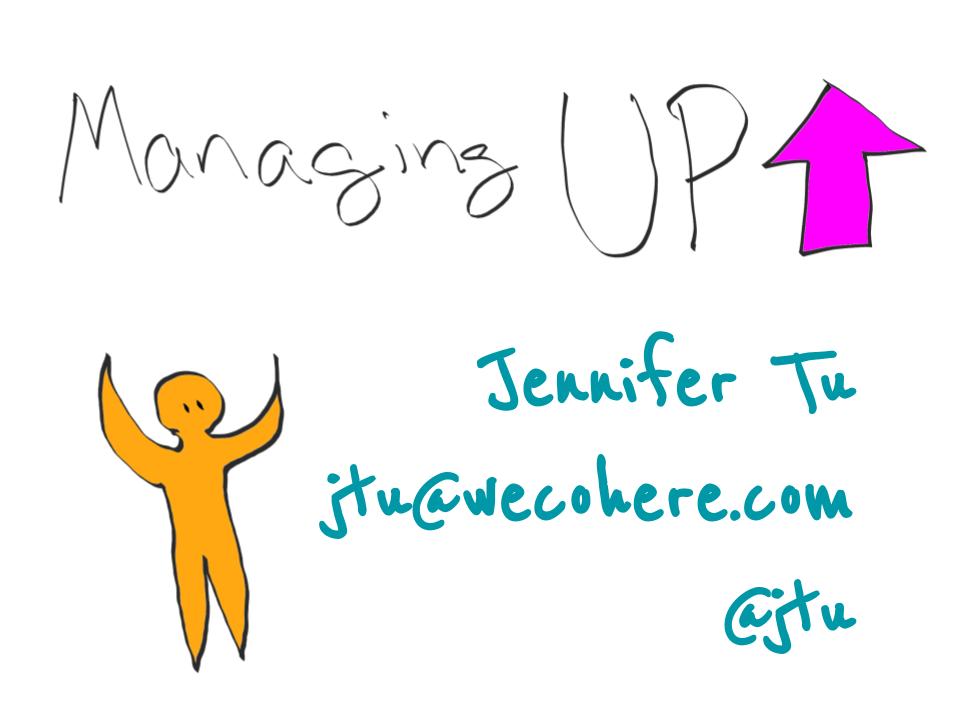A few months back, I shared a quick lightning talk at Fog City Ruby on managing up. This article is a quick primer on one way to approach your manager about your goals, and assumes a sympathetic manager who doesn’t require advanced managing up.

Sometimes we find ourselves liking our jobs, but wanting something a little different than what we have. Maybe you want to work on a different project. Perhaps you want to change your work hours. Or maybe you would like a raise.
When we find ourselves in this situation, this is an opportunity to manage up. Managing up is taking what you want, and figuring out how to align it with what your manager wants. If you can find the way to phrase what you want in a way that your manager wants it too, then they’ll be more likely to support you in achieving your goal.

Managing up is about asking for change. But you know what’s scary?
- Change
- Asking for things.
Why should you do two scary things? Why bother managing up?
When you ask for something, sometimes you get what you asked for. For the price of a few seconds of discomfort, you’ve set yourself on a trajectory to do more of what you want to be doing at your job and in your career.
Not only might managing up get what you want, managing up can get you even more than that.
When you speak up about what you want, your managing up can become this beautiful collaboration in which you and your manager work together to solve a problem – specifically, the problem of how to help both of you. It also primes your manager to think of your interests more. The act of talking about change – just that act by itself – makes it easier to talk about change again in the future, for both you to your manager, and for your manager to you. That means it will be that much easier to have the next discussion about a possible (bigger) change.

What do you need to do to start managing up?
To manage up effectively, the first thing you’re going to need is to know your goal. What’s the outcome you’re looking for? What would you like to happen?
What do you wish were different?
Think about what you want to change.
Do you want a change in responsibility? in projects? in people?
Or maybe you don’t want change, and you want to make sure you get to keep doing what you’re doing.
Think about what’s important to you.
What do you want to happen next?
after you’re done with your current project?
down the road in your career?
How about the intersection of your life and your job?
It’s ok if you don’t have an answer in mind. If you have a problem you want to solve or an issue you want to raise, this is your chance to make it an open dialogue between you and your manager. This could be an opportunity for you to collaborate and solve something together.

How do you open up that dialogue and start to manage up?
The secret here is to slip into your manager’s shoes for a minute, and anticipate what they want.
- What does the manager see as their job or mission?
- How do you fit into this picture?
Maybe they want to maintain a service you started, and to do that, they think you must spend all your time forever tied to this thing you worked on a few years ago.
Maybe there’s a project they want to deliver, and they haven’t figured out yet what role you or anyone else on your team is going to play in making it happen.
Take some time to think about this. If you don’t know these answers, that’s ok too – go learn it. Talk with a teammate. Ask your manager about it at your next 1-1.
When you understand what your manager’s goals are, go back to your own goal. How does what you want fit into this picture? When you understand that, you’re ready. That understanding is what you want to share when you meet with your manager.

At this point, you’re ready to talk with your manager. There are a few things you can do to set the stage for success.
Let them know what to expect.
Think about how you’d feel if your manager said only “Can we talk?”. Your mind immediately jumps to the worst possibilities, and readies for flight-or-fight. Don’t make your manager brace for the worst. Set your meeting up for success by giving them a little heads up.
You could email them with a note that you want to talk about your goals at your next 1-1. Or you could schedule a one-off meeting and include your agenda in the invitation. Do what makes sense in your situation.
Give your manager enough detail that they can come into the meeting knowing roughly what to expect, so they can be ready to collaborate with you (instead of panicking that you’re giving notice).
Schedule ahead
Think about how you’d feel if you’re in the middle of something, and your manager says “I want your opinion this will take just a minute”. It’s hard to feel a collaborative spirit when you’ve been interrupted. While many managers may pride themselves on their ability to switch focus immediately, why force them to practice that skill? why not set them up to be ready the moment you see each other?
Plan ahead and schedule something that will catch them at their most open time (bad times: over their lunch break, while they’re trying to catch their train).
Give an easy out
Be ready to give your manager an easy out from talking about it. Sometimes people think they’re ready to discuss something, but the previous meeting’s problems are still top-of-mind. Pay close attention to how your manager is feeling when you talk. Give them a free rescheduling pass if they’re not able to be fully present. “Hey boss, you seem a little more distracted than usual. Is this still a good time? We can reschedule if you’d like.” You’re going to be more effective if both of you are able to focus and bring your entire self to the discussion.
Talk privately
Finally, make sure you have your discussion somewhere private. Give your manager the security to explore ideas and hypotheticals with you. Book a private conference room, and make sure you’re both able to concentrate on the topic at hand.
Managing up can seem like a scary skill to start, but investing in this skill now will pay off as you are better able to grow your career in a collaborative environment.
